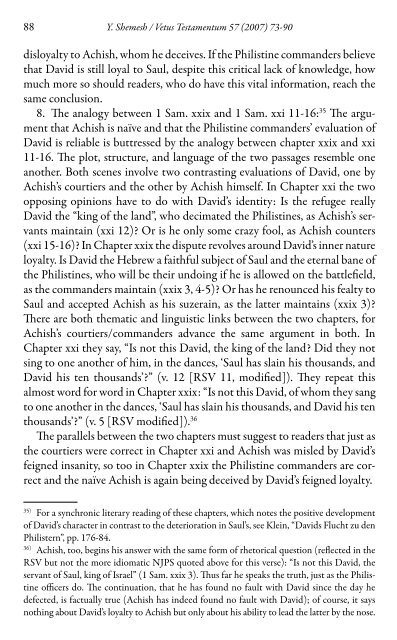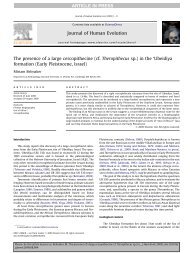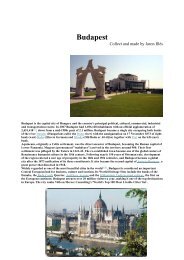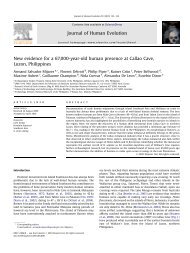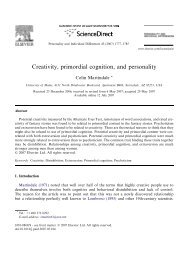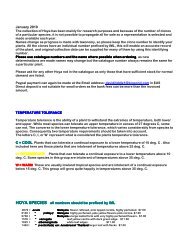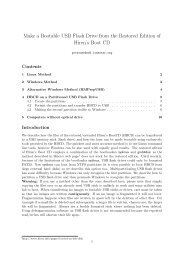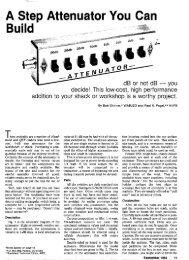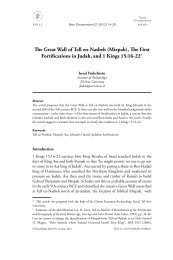David in the Service of King Achish of Gath: Renegade to His ...
David in the Service of King Achish of Gath: Renegade to His ...
David in the Service of King Achish of Gath: Renegade to His ...
Create successful ePaper yourself
Turn your PDF publications into a flip-book with our unique Google optimized e-Paper software.
88 Y. Shemesh / Vetus Testamentum 57 (2007) 73-90<br />
disloyalty <strong>to</strong> <strong>Achish</strong>, whom he deceives. If <strong>the</strong> Philist<strong>in</strong>e commanders believe<br />
that <strong>David</strong> is still loyal <strong>to</strong> Saul, despite this critical lack <strong>of</strong> knowledge, how<br />
much more so should readers, who do have this vital <strong>in</strong>formation, reach <strong>the</strong><br />
same conclusion.<br />
8. Th e analogy between 1 Sam. xxix and 1 Sam. xxi 11-16: 35 Th e argument<br />
that <strong>Achish</strong> is naïve and that <strong>the</strong> Philist<strong>in</strong>e commanders’ evaluation <strong>of</strong><br />
<strong>David</strong> is reliable is buttressed by <strong>the</strong> analogy between chapter xxix and xxi<br />
11-16. Th e plot, structure, and language <strong>of</strong> <strong>the</strong> two passages resemble one<br />
ano<strong>the</strong>r. Both scenes <strong>in</strong>volve two contrast<strong>in</strong>g evaluations <strong>of</strong> <strong>David</strong>, one by<br />
<strong>Achish</strong>’s courtiers and <strong>the</strong> o<strong>the</strong>r by <strong>Achish</strong> himself. In Chapter xxi <strong>the</strong> two<br />
oppos<strong>in</strong>g op<strong>in</strong>ions have <strong>to</strong> do with <strong>David</strong>’s identity: Is <strong>the</strong> refugee really<br />
<strong>David</strong> <strong>the</strong> “k<strong>in</strong>g <strong>of</strong> <strong>the</strong> land”, who decimated <strong>the</strong> Philist<strong>in</strong>es, as <strong>Achish</strong>’s servants<br />
ma<strong>in</strong>ta<strong>in</strong> (xxi 12)? Or is he only some crazy fool, as <strong>Achish</strong> counters<br />
(xxi 15-16)? In Chapter xxix <strong>the</strong> dispute revolves around <strong>David</strong>’s <strong>in</strong>ner nature<br />
loyalty. Is <strong>David</strong> <strong>the</strong> Hebrew a faithful subject <strong>of</strong> Saul and <strong>the</strong> eternal bane <strong>of</strong><br />
<strong>the</strong> Philist<strong>in</strong>es, who will be <strong>the</strong>ir undo<strong>in</strong>g if he is allowed on <strong>the</strong> battlefield,<br />
as <strong>the</strong> commanders ma<strong>in</strong>ta<strong>in</strong> (xxix 3, 4-5)? Or has he renounced his fealty <strong>to</strong><br />
Saul and accepted <strong>Achish</strong> as his suzera<strong>in</strong>, as <strong>the</strong> latter ma<strong>in</strong>ta<strong>in</strong>s (xxix 3)?<br />
Th ere are both <strong>the</strong>matic and l<strong>in</strong>guistic l<strong>in</strong>ks between <strong>the</strong> two chapters, for<br />
<strong>Achish</strong>’s courtiers/commanders advance <strong>the</strong> same argument <strong>in</strong> both. In<br />
Chapter xxi <strong>the</strong>y say, “Is not this <strong>David</strong>, <strong>the</strong> k<strong>in</strong>g <strong>of</strong> <strong>the</strong> land? Did <strong>the</strong>y not<br />
s<strong>in</strong>g <strong>to</strong> one ano<strong>the</strong>r <strong>of</strong> him, <strong>in</strong> <strong>the</strong> dances, ‘Saul has sla<strong>in</strong> his thousands, and<br />
<strong>David</strong> his ten thousands’?” (v. 12 [RSV 11, modified]). Th ey repeat this<br />
almost word for word <strong>in</strong> Chapter xxix: “Is not this <strong>David</strong>, <strong>of</strong> whom <strong>the</strong>y sang<br />
<strong>to</strong> one ano<strong>the</strong>r <strong>in</strong> <strong>the</strong> dances, ‘Saul has sla<strong>in</strong> his thousands, and <strong>David</strong> his ten<br />
thousands’?” (v. 5 [RSV modified]). 36<br />
Th e parallels between <strong>the</strong> two chapters must suggest <strong>to</strong> readers that just as<br />
<strong>the</strong> courtiers were correct <strong>in</strong> Chapter xxi and <strong>Achish</strong> was misled by <strong>David</strong>’s<br />
feigned <strong>in</strong>sanity, so <strong>to</strong>o <strong>in</strong> Chapter xxix <strong>the</strong> Philist<strong>in</strong>e commanders are correct<br />
and <strong>the</strong> naïve <strong>Achish</strong> is aga<strong>in</strong> be<strong>in</strong>g deceived by <strong>David</strong>’s feigned loyalty.<br />
35) For a synchronic literary read<strong>in</strong>g <strong>of</strong> <strong>the</strong>se chapters, which notes <strong>the</strong> positive development<br />
<strong>of</strong> <strong>David</strong>’s character <strong>in</strong> contrast <strong>to</strong> <strong>the</strong> deterioration <strong>in</strong> Saul’s, see Kle<strong>in</strong>, “<strong>David</strong>s Flucht zu den<br />
Philistern”, pp. 176-84.<br />
36) <strong>Achish</strong>, <strong>to</strong>o, beg<strong>in</strong>s his answer with <strong>the</strong> same form <strong>of</strong> rhe<strong>to</strong>rical question (reflected <strong>in</strong> <strong>the</strong><br />
RSV but not <strong>the</strong> more idiomatic NJPS quoted above for this verse): “Is not this <strong>David</strong>, <strong>the</strong><br />
servant <strong>of</strong> Saul, k<strong>in</strong>g <strong>of</strong> Israel” (1 Sam. xxix 3). Th us far he speaks <strong>the</strong> truth, just as <strong>the</strong> Philist<strong>in</strong>e<br />
<strong>of</strong>ficers do. Th e cont<strong>in</strong>uation, that he has found no fault with <strong>David</strong> s<strong>in</strong>ce <strong>the</strong> day he<br />
defected, is factually true (<strong>Achish</strong> has <strong>in</strong>deed found no fault with <strong>David</strong>); <strong>of</strong> course, it says<br />
noth<strong>in</strong>g about <strong>David</strong>’s loyalty <strong>to</strong> <strong>Achish</strong> but only about his ability <strong>to</strong> lead <strong>the</strong> latter by <strong>the</strong> nose.


